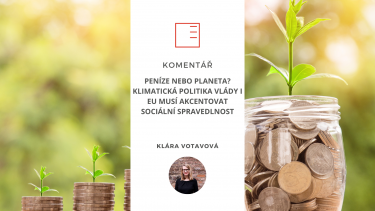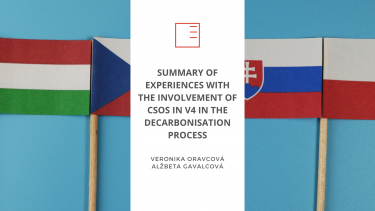Policy Paper | The future is electric: role of Visegrad countries in the EV battery supply chain
The car industry is a crucial player for the economies of each Visegrad country, but to remain competitive adaptation is necessary. Since the shift from ICE to EVs leads to a substantial need for Critical Raw Materials (CRM), the V4 countries have and must continue to position themselves along the different parts of the EV battery supply chain from mining, refining to manufacturing, reuse and recycling as well as R&D into new battery chemistries. The future is electric: role of the Visegrad countries in the EV battery supply chain report addresses areas for Visegrad countries to ensure a sustainable and reliable EV battery supply chain.
Show more PDF
Policy Paper | The future is electric: role of Visegrad countries in the EV battery supply chain
Automobilový průmysl je pro ekonomiky všech visegrádských zemí klíčovým hráčem, ale pro zachování konkurenceschopnosti je nutné se mu přizpůsobit. Vzhledem k tomu, že přechod od vozidel s vnitřním spalovacím motorem k elektrickým vozidlům vede ke značné potřebě kritických surovin (Critical Raw Materials - CRM), země V4 se musely a musejí i nadále snažit zaujmout pozici v různých částech dodavatelského řetězce baterií pro elektrická vozidla, od těžby, rafinace až po výrobu, opětovné použití a recyklaci, jakož i výzkum a vývoj nových chemických technologií baterií. Zpráva The future is electric: Role of the Visegrad countries in the EV battery supply chain (Budoucnost je elektrická: role zemí Visegrádu v dodavatelském řetězci baterií pro elektromobily) se zabývá oblastmi, v nichž mohou země Visegrádu zajistit udržitelný a spolehlivý dodavatelský řetězec baterií pro elektromobily.
Show more PDF
INVITATION | EU-Pacific Talks: Be small and beautiful - future of nuclear energy?
We would like to invite you to the EU-Pacific Talks: Be small and beautiful - future of nuclear energy, which will take place on 28 March at 15:00 online on our Facebook page.
Show more
POZVÁNKA | EU-Pacific Talks: Be small and beautiful - future of nuclear energy?
Rádi bychom Vás pozvali na debatu EU-Pacific Talks: Be small and beautiful - future of nuclear energy, která se bude konat 28.3. od 15:00 online na našem Facebooku.
Show more
BLOG | Money or planet? Government Climate Policy | EU must emphasise social justice
When the European Parliament finally confirmed the ban on the sale of cars with internal combustion engines in the EU in 2035, it sparked a new round of a well-known debate in the Czech Republic. Is climate and environmental protection worth the threat to prosperity in countries with strong car industries like the Czech Republic? Klára Votavová discussed this topic.
Show morePOLICY PAPER | The lingering war in Ukraine: Security implications in Europe
Orsolya Ráczová writes that it is difficult to predict the long-term effects of war with certainty, yet it is essential to be aware of the fact that the longer a war continues, the more dire its long-term impact becomes. The era of relative peace and stability in Europe is over, security should no longer be taken for granted. Europe needs to rethink its security at EU, NATO and Member State level. It is also essential to strike the right balance to ensure security at home while providing much-needed support to Ukraine.
Show moreSUMMARY OF EXPERIENCES WITH THE INVOLVEMENT OF CSOS IN V4 IN THE DECARBONISATION PROCESS
The project is focused on the examination of the role of non-governmental organizations in the process of decarbonization of coal regions in V4 countries (Czech Republic, Hungary, Poland, Slovakia). The aim of the project is to describe the best and worst practices of the individual processes for Serbia, who awaits the transformation of its energy mix, largely based on coal. The examined V4 countries have had a slightly different share of coal in their energy mix, while the largest one being in Poland and the second largest one in the Czech Republic, followed by Hungary and Slovakia. There are many similarities and differences in their takes on decarbonisation, thus providing different range of experiences.
Show more PDF

SUMMARY OF EXPERIENCES WITH THE INVOLVEMENT OF CSOS IN V4 IN THE DECARBONISATION PROCESS
Projekt je zaměřen na zkoumání role nevládních organizací v procesu dekarbonizace uhelných regionů v zemích V4 (Česká republika, Maďarsko, Polsko, Slovensko). Cílem projektu je popsat nejlepší a nejhorší praxi jednotlivých procesů pro Srbsko, které čeká transformace jeho energetického mixu založeného z velké části na uhlí. Zkoumané země V4 mají mírně odlišný podíl uhlí ve svém energetickém mixu, přičemž největší je v Polsku a druhý největší v České republice, následuje Maďarsko a Slovensko. V jejich přístupu k dekarbonizaci existuje mnoho podobností i rozdílů, a poskytují tak různou škálu zkušeností.
Show more PDF

VOXPOT: The EU, with Sweden at the helm, is heading into uncharted waters. Green Europe and migration solutions on the horizon
At the turn of the year, Sweden took over the Presidency of the Council of the EU from the Czech Republic and will be responsible for leading the Union for the next six months. Although the Swedes have a reputation for being solid and liberal-minded partners, there are concerns about the great unknown because of the composition of their current government. For the first time in history, it is supported by the far-right Sweden Democrats. Our Senior Research Fellow Vít Havelka wrote this article for VOXPOT.
Show more
iDNES: Major reform of emission allowances coming, will make fuel and coal more expensive
Against all odds, the EU is sticking to its goal of becoming climate neutral by 2050. The next step is a major reform of emission allowances, tentatively agreed by EU Council and European Parliament negotiators just before Christmas. Emissions trading (ETS) will also apply to buildings and road transport from 2027. Our Senior Researcher Kateřina Davidová commented on this issue for iDNES.
Show more
Staroměstské náměstí 4/1
Prague 1 - Staré Město
110 00
tel.: +420 212 246 552
email: europeum@europeum.org
https://www.europeum.org







